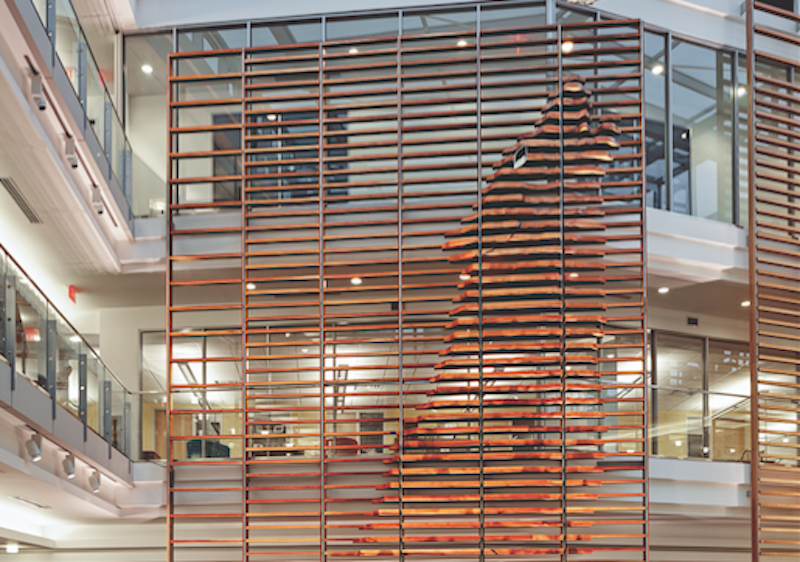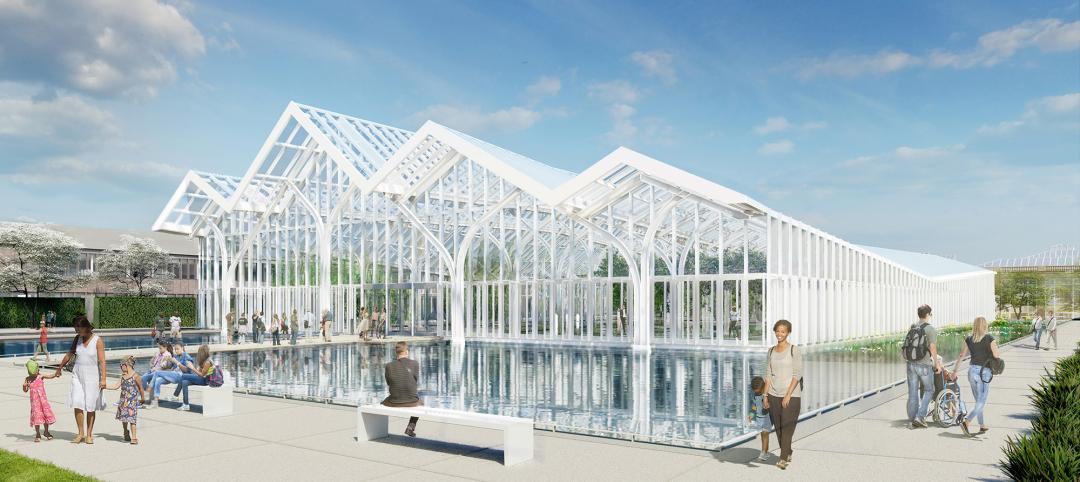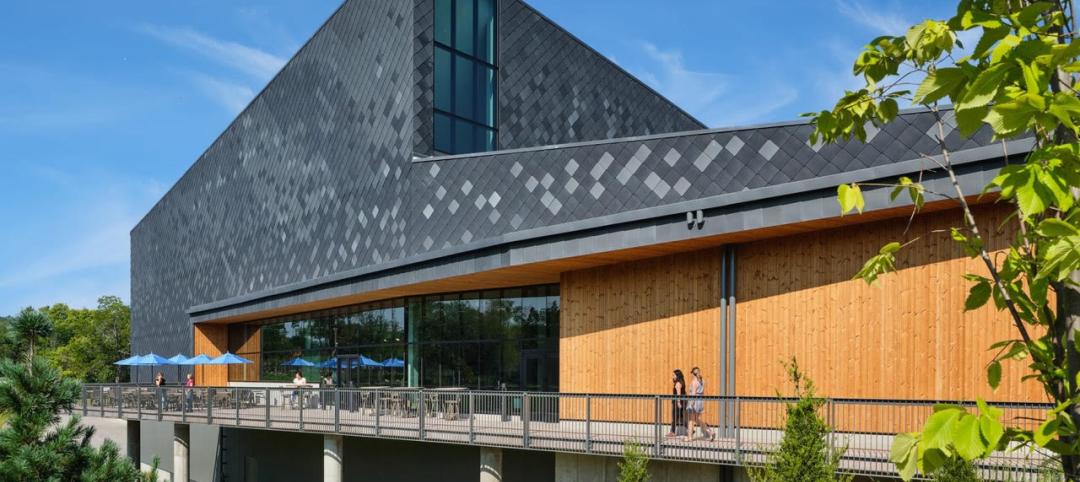Funding for the nation’s 1,700 or so public two- and four-year colleges remains well below pre-recession levels. Average state spending per student has fallen 17%—about $1,525—since the recession, according to the Center on Budget and Policy Priorities.
TOP 100 UNIVERSITY ARCHITECTURE FIRMS
Rank, Firm, 2015 Revenue
1. Gensler $79,810,000
2. Perkins+Will $59,960,000
3. CannonDesign $56,800,000
4. EYP $46,539,910
5. Stantec $37,993,785
6. Robert A.M. Stern Architects $24,802,000
7. Clark Nexsen $24,561,000
8. S/L/A/M Collaborative, The $21,833,000
9. CO Architects $21,475,500
10. HDR $21,406,400
TOP 100 UNIVERSITY CONSTRUCTION FIRMS
Rank, Firm, 2015 Revenue
1. Turner Construction Co. $1,124,325,847
2. Whiting-Turner Contracting Co., The $772,402,993
3. Skanska USA $535,834,200
4. Messer Construction Co. $521,400,000
5. Barton Malow Co. $470,447,175
6. Gilbane Building Co. $429,741,000
7. McCarthy Holdings $357,875,128
8. Consigli Building Group $343,722,913
9. Clark Group $335,471,145
10. Hensel Phelps $305,040,000
TOP 70 UNIVERSITY ENGINEERING FIRMS
Rank, Firm, 2015 Revenue
1. AECOM $65,000,000
2. WSP | Parsons Brinckerhoff $37,988,000
3. Jacobs $31,600,000
4. Affiliated Engineers $19,264,000
5. KJWW / TTG $16,943,913
6. Arup $15,856,593
7. Vanderweil Engineers $15,351,800
8. Simpson Gumpertz & Heger $13,586,000
9. Thornton Tomasetti $13,363,234
10. Dewberry $12,904,401
Money woes will continue to affect capital budgets and operations and maintenance allocations, says Mike Broge, PE, LEED AP, Higher Education Market Leader with Affiliated Engineers. That will only worsen an already significant backlog of deferred maintenance at many institutions, he says.
Budget constraints are compelling some public institutions to pursue alternative methods of financing their major building projects.
The University of Kansas leveraged a public-private partnership to initiate a $350 million redevelopment of its central district. The P3 deal includes a 265,000-sf integrated science building, a 40,000-sf student union, a central utility plant, student housing, and infrastructure upgrades. Most of the projects are scheduled for completion in mid-2018.
The University of Kentucky is among the schools that are enlisting developers to oversee their large on-campus projects. Memphis-based EdR is developing 14 new residence halls totaling 2.6 million sf on the Lexington campus. Two buildings are scheduled to open this fall; the others will be completed next summer.
“This approach keeps costs off universities’ books while still allowing them to stay ahead of the competitive curve with their facilities and on-campus amenities,” says Tim Steigerwald, SVP with Messer Construction.
Lack of capital has also contributed to a surge in master planning projects. Steigerwald says the University of Wisconsin is developing master plans for at least three large colleges, plus an overall campus infrastructure master plan. The goal: to achieve more efficient use of existing facilities through lower-cost renovations and spatial reconfigurations, thus avoiding costly additions or new facilities.
THE RISE OF INNOVATION SPACES ON Campus
To better equip students to excel in their future work environments, schools are developing a range of innovation spaces that promote hands-on, cross-disciplinary learning, foster unique business and industry partnerships, and encourage entrepreneurship.
Jeff Stebar, AIA, LEED AP, Higher Education Practice Leader at Perkins+Will, says that a phenomenon he calls “serendipitous cross-pollination” can occur across multiple disciplines working together in the same place. Such a structure models the 21st-century workplace and adds richness to the educational experience. “These spaces are typically owned by everyone, not by any specific college or dean,” he says.
That’s the idea behind the Collaborative Learning and Innovation Complex at Tufts University, Medford, Mass. Designer Stantec is transforming a 100-year-old warehouse into a new 95,000-sf facility that will house seven departments, ranging from physics and robotics to human development and community health. The teaching/research building incorporates open research labs shared by multiple areas of study, along with public social zones to foster interdepartmental collaboration. The project is part of a new Science and Technology Corridor that will also include a new 80,000-sf Science and Engineering Complex, designed by Payette. It is scheduled to open in 2017.
At the University of Utah, Lassonde Studios, designed by CannonDesign and Yazdani Studio, fuses a 400-bed residence hall with 20,000 sf of “garage space” where students can build a prototype, attend an event, or launch a business. Opening this fall, the facility has been designed to advance the university’s nationally ranked entrepreneurship program.
College libraries are also adapting to include technology-driven laboratories, informal group study workspaces, and cafés. A new 220,000-sf library under construction on Temple University’s main campus in Philadelphia will replace an existing 1960s-era facility with a dynamic, technology-rich environment. Designed by Snøhetta and Stantec, the $170 million project will accommodate Temple’s 2.5-million volume collection, student study space, research space, and staff areas.
A renewed interest in health careers is fueling demand for new health profession classroom buildings, clinical labs, and health-related research facilities.
“This trend is due in large part to a growing number of students who recognize the career opportunities afforded by a healthcare industry in the midst of a significant workforce shortage,” says Steve Rhoades, PE, LEED AP, Managing Principal, KJWW.
A 70,000-sf addition to the Columbia University nursing school is currently under construction in Manhattan. Designed by CO Architects and FXFOWLE, the seven-story structure will supplement the school’s existing classroom facilities with healthcare simulation technology, research facilities, and collaboration space. Expected to open in 2017, the building will include mock operating rooms, ICUs, ERs, and exam rooms where students can hone their nursing skills.
Private institutions are also jumping on the healthcare education bandwagon. The University of Pikeville, a private liberal arts college of 2,300 students in the coal country of Kentucky, is building a new 100,000-sf health professions education building that will open next year. Designed by Ayers Saint Gross, the facility will house the Bluegrass State’s first College of Optometry, as well as a nursing facility. The project is part of a strategic plan to upgrade the education needs of the Central Appalachia region and meet the growing demand for optometrists.
RETURN TO THE GIANTS 300 LANDING PAGE
Related Stories
Market Data | Apr 1, 2024
Nonresidential construction spending dips 1.0% in February, reaches $1.179 trillion
National nonresidential construction spending declined 1.0% in February, according to an Associated Builders and Contractors analysis of data published today by the U.S. Census Bureau. On a seasonally adjusted annualized basis, nonresidential spending totaled $1.179 trillion.
Affordable Housing | Apr 1, 2024
Biden Administration considers ways to influence local housing regulations
The Biden Administration is considering how to spur more affordable housing construction with strategies to influence reform of local housing regulations.
Affordable Housing | Apr 1, 2024
Chicago voters nix ‘mansion tax’ to fund efforts to reduce homelessness
Chicago voters in March rejected a proposed “mansion tax” that would have funded efforts to reduce homelessness in the city.
Standards | Apr 1, 2024
New technical bulletin covers window opening control devices
A new technical bulletin clarifies the definition of a window opening control device (WOCD) to promote greater understanding of the role of WOCDs and provide an understanding of a WOCD’s function.
Adaptive Reuse | Mar 30, 2024
Hotel vs. office: Different challenges in commercial to residential conversions
In the midst of a national housing shortage, developers are examining the viability of commercial to residential conversions as a solution to both problems.
Sustainability | Mar 29, 2024
Demystifying carbon offsets vs direct reductions
Chris Forney, Principal, Brightworks Sustainability, and Rob Atkinson, Senior Project Manager, IA Interior Architects, share the misconceptions about carbon offsets and identify opportunities for realizing a carbon-neutral building portfolio.
Reconstruction & Renovation | Mar 28, 2024
Longwood Gardens reimagines its horticulture experience with 17-acre conservatory
Longwood Gardens announced this week that Longwood Reimagined: A New Garden Experience, the most ambitious revitalization in a century of America’s greatest center for horticultural display, will open to the public on November 22, 2024.
Office Buildings | Mar 27, 2024
A new Singapore office campus inaugurates the Jurong Innovation District, a business park located in a tropical rainforest
Surbana Jurong, an urban, infrastructure and managed services consulting firm, recently opened its new headquarters in Singapore. Surbana Jurong Campus inaugurates the Jurong Innovation District, a business park set in a tropical rainforest.
Cultural Facilities | Mar 27, 2024
Kansas City’s new Sobela Ocean Aquarium home to nearly 8,000 animals in 34 habitats
Kansas City’s new Sobela Ocean Aquarium is a world-class facility home to nearly 8,000 animals in 34 habitats ranging from small tanks to a giant 400,000-gallon shark tank.
Market Data | Mar 26, 2024
Architecture firm billings see modest easing in February
Architecture firm billings continued to decline in February, with an AIA/Deltek Architecture Billings Index (ABI) score of 49.5 for the month. However, February’s score marks the most modest easing in billings since July 2023 and suggests that the recent slowdown may be receding.

















